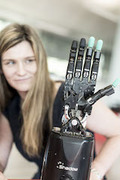- Prospective Applicants
-
Current PhD Researchers
- Careers and Opportunities
- Careers
- Go Global
- Science Shop
-
Supervisors
- Find a PhD
- PhD Manager
Continuous advancements in robotics show that robots are being increasingly equipped with complex skills to solve a variety of problems. These skills are the result of research being conducted in laboratories and companies, crafted by developers and tested in sample environments. However, unlike a computer program, a robot has to operate in a world where the possibilities are potentially infinite and where it has to continuously adapt its basic programmed skills to face previously unforeseen situations. Unfortunately, there has been no successful development of robots that are autonomously capable of improving or adapting the basic skills with which they were initially equipped – something that comes natural to humans.
In this project, we propose to address these problems by developing a new skills building framework that allows a robot to successfully complete complex tasks by using previously learned primitive actions obtained from a skills library that resides in the Cloud. This library will be populated with primitive actions, such as grasping or object manipulation, from many robot sources, therefore vastly increasing the knowledge available for robots when faced with an unknown complex task utilising a combination of tactile, vision and action sensor data. To acquire these primitive actions, an approach known as Dynamic Motion Primitives (DMPs) will be used to imitate the bahaviour of a human’s action [1]. This one-shot learning approach will enable robot skills to be derived from observations of a human's solution to a task, omitting the requirement to analytically decompose and manually program a desired behaviour. The developed framework will combine such primitive actions in a hierarchical manner to accomplish tasks that require a more complex solution. On achieving this, we will further extend the approach to enable multiple robots to co-operate on a single task, utilising cognitive approaches for task allocation based on existing robot skills or a robot’s capability to perform a new skill. We will incorporate recent advances developed in the European project RoboHow [2], where previously learned primitive actions are obtained from a skills library residing in the Cloud, populated with primitive actions from many robot sources.
This project will make use of mobile robots that are available in the ISRC robotics lab [3], in particular the state of the art PR2 mobile manipulator robot [4], the Schunk manipulator arm robots [5], the BioTAC sensors and the Vicon system. The skills library will use a cloud architecture service such as Microsoft Azure [6] as a platform for robot knowledge sharing.
References
[1]Ijspeert, Auke Jan, Jun Nakanishi, and Stefan Schaal. "Movement imitation with nonlinear dynamical systems in humanoid robots." Proceedings, IEEE International Conference on Robotics and Automation, Vol. 2, 2002.
[2]http://www.robohow.eu
[3]http://isrc.ulster.ac.uk/Cognitive-Robotics-Team/Home.html
[4]http://www.willowgarage.com/pages/pr2/overview
[5]http://www.schunk.com/schunk_files/attachments/ModularRobotics_2010-06_EN.pdf
[6]http://www.windowsazure.com/en-us/home/scenarios/cloud-services/
Applicants should hold, or expect to obtain, a First or Upper Second Class Honours Degree in a subject relevant to the proposed area of study.
We may also consider applications from those who hold equivalent qualifications, for example, a Lower Second Class Honours Degree plus a Master’s Degree with Distinction.
In exceptional circumstances, the University may consider a portfolio of evidence from applicants who have appropriate professional experience which is equivalent to the learning outcomes of an Honours degree in lieu of academic qualifications.
If the University receives a large number of applicants for the project, the following desirable criteria may be applied to shortlist applicants for interview.
The University offers the following levels of support:
The following scholarship options are available to applicants worldwide:
These scholarships will cover full-time PhD tuition fees for three years (subject to satisfactory academic performance) and will provide a £900 per annum research training support grant (RTSG) to help support the PhD researcher.
Applicants who already hold a doctoral degree or who have been registered on a programme of research leading to the award of a doctoral degree on a full-time basis for more than one year (or part-time equivalent) are NOT eligible to apply for an award.
Please note: you will automatically be entered into the competition for the Full Award, unless you state otherwise in your application.
The scholarship will cover tuition fees at the Home rate and a maintenance allowance of £19,000 (tbc) per annum for three years (subject to satisfactory academic performance).
This scholarship also comes with £900 per annum for three years as a research training support grant (RTSG) allocation to help support the PhD researcher.
Due consideration should be given to financing your studies. Further information on cost of living
Submission deadline
Monday 19 February 2018
12:00AM
Interview Date
12 March 2018
Preferred student start date
mid September 2018

Telephone
Contact by phone
Email
Contact by email